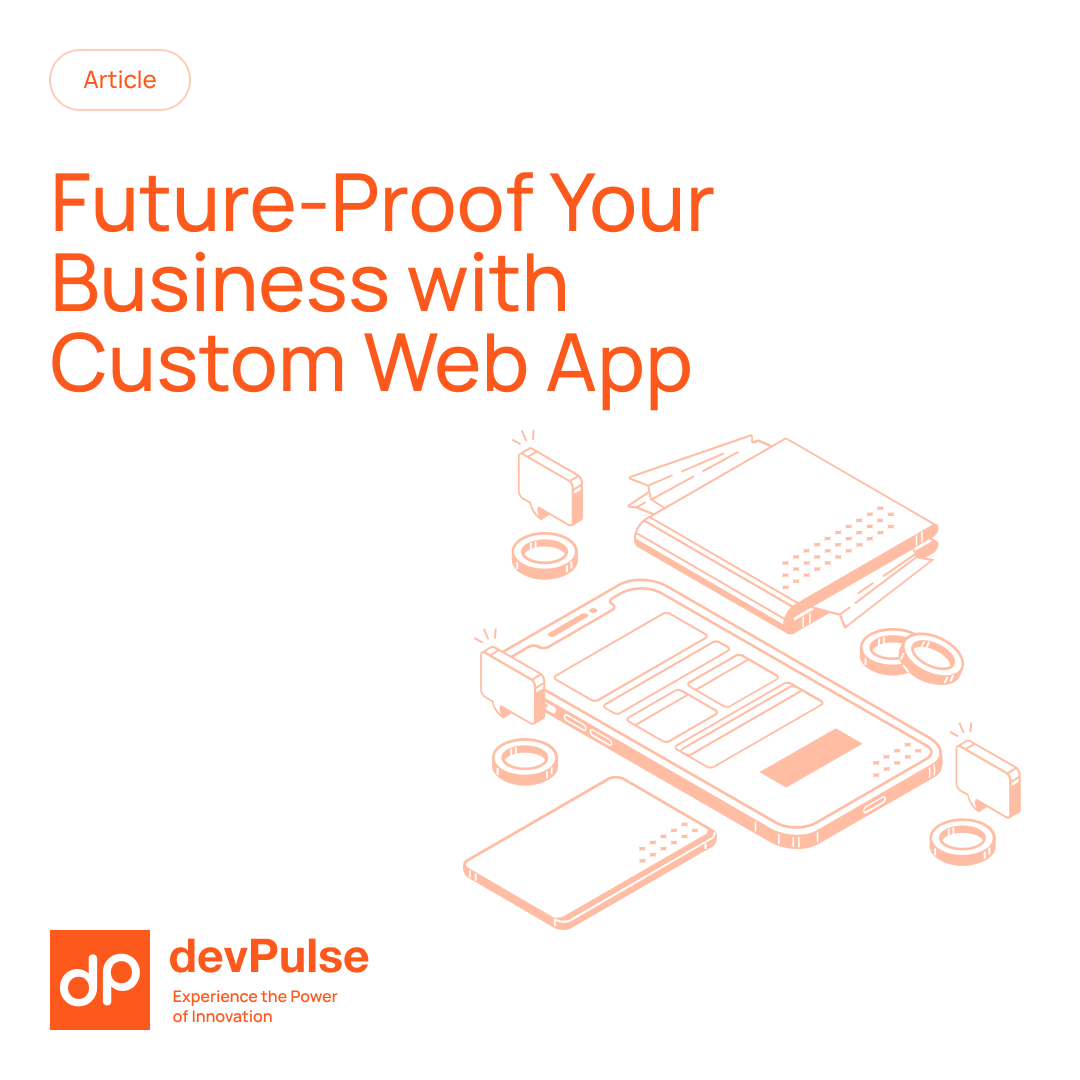How do you “future-proof” a digital application? Surely with how quick things change and deviate, it’s impossible to make an app that stands the test of time.
And you’re right! A web app must constantly change with diverging demands, needs, and expectations. Thus, an app that stands the test of time is the one that has been built with scalability and flexbility in mind.
And that flexibility – is the key avantage of the custom web appplications which we’ll talk about at length in today’s article.
Let’s dig in!
The limitations of off-the-shelf software solutions
So, why not go with an out-of-the-box solution? Off-the-shelf software solutions are often rigid and inflexible. They come with predefined features and functionalities that may not match your unique business needs.
Customizing these solutions to your requirements can be difficult, time-consuming, and expensive.
Integrating these with your existing systems is also challenging, hindering productivity and slowing business processes.
The limitations of off-the-shelf software include:
- Lack of customization options
- Difficulty in integrating with existing systems
- Inability to scale with business growth
- Potential security vulnerabilities
Scaling these solutions can be costly and complex, often requiring significant investments in hardware and infrastructure.
Out-of-the-box solutions may also have security vulnerabilities that put your sensitive data at risk. Hackers often target these solutions due to their widespread use and known weaknesses.
All these limitations don’t necessarily mean that out-of-the-box is always a wrong choice!
When discussing custom vs. out-of-the-box solutions, you must consider your needs, expectations, and use cases. In our experience, it’s not rare for a client to show up seeking a custom solution only to realize that a readymade one is more than serviceable.
The benefits of custom web apps
But today’s article is about custom web apps, so let’s discuss these benefits in depth. Unlike off-the-shelf solutions, they are built from the ground up to align with your unique needs and expectations.
One of the critical advantages of custom web apps is their ability to integrate with your existing infrastructure seamlessly. How’s that accomplished? When building a custom solution, we can account for your existing tech stack during the design and research stage of custom web development.
The benefits of custom web apps include:
- Tailored to specific business needs and processes
- Seamless integration with existing infrastructure
- Scalability to accommodate business growth and changing requirements
- Enhanced security features to protect sensitive data
As they are created with scalability in mind, custom web apps can quickly scale to accommodate increased traffic, users, and data volume. This flexibility ensures that your web app can grow alongside your business without the need for costly overhauls or replacements.
Custom web apps also prioritize security, with robust measures to protect sensitive data. . By investing in a custom solution, you can have peace of mind knowing that your data is safe and secure.
But what is scalability, anyway, and why should we care about it? Great question! Let’s talk about it in-depth.
Scalability: growing your business with custom web apps
So, your business is booming (hooray!), and you’re experiencing a big spike in traffic and user demand. While this growth is exciting, it can also be overwhelming if your web application isn’t built to handle the increased load.
In the worst-case scenario, your site will become slow, unresponsive, or completely inaccessible. Thus, you will miss out on this traffic gain, and would-be customers will be left with a wrong impression of your brand without even interacting with it.
That’s why scalability – the ability to grow your web app with the rising demand – is an essential foundational block of a modern web application.
Here are some ways custom web apps enable scalability:
- Load balancing: By distributing traffic across multiple servers, custom web apps can handle increased user demand without breaking a sweat.
- Performance optimization: Custom web apps are built with performance in mind, using techniques like caching and lazy loading to ensure lightning-fast load times.
- Modular architecture: With a modular design, custom web apps can easily integrate new features and functionalities as your business needs evolve.
Take, for example, the e-commerce giant Amazon. By investing in a custom web application, they could handle millions of transactions per day and scale their business to become a global powerhouse.
The beauty of custom web apps lies in their ability to grow with your business. You won’t find yourself limited by the constraints of off-the-shelf solutions. Instead, you’ll have a purpose-built web application to support your business goals and accommodate your future growth.
Adapting to changing business needs through flexible app design
If scaling is vertical growth, then flexibility is horizontal one. Some industries are pretty static and rigid. It makes little sense to deviate once you’re on the right course.
Others, however, are more mercurial, and thus the ability to shift gears is to be expected. Custom web apps provide the flexibility needed to pivot and adjust to changing market conditions, customer demands, and technological advancements.
A great example of how custom web app flexibility allows businesses to meet market demands is Uber. Uber’s custom web app, which powers its ride-hailing service, has demonstrated remarkable flexibility in adapting to evolving market needs.
Uber’s custom web app allowed them to:
- Introduce new ride options: As customer preferences changed, Uber used the flexibility of their custom web app to introduce new ride options like UberPOOL (shared rides) and UberXL (larger vehicles). These new features were seamlessly integrated into their existing app, allowing them to cater to a broader range of customer needs and price points.
- Implement dynamic pricing: Uber can adjust fares based on real-time supply and demand. This flexibility enabled them to optimize pricing, ensure driver availability during peak hours, and maintain a balanced marketplace.
- Integrate with local payment methods: As Uber expanded to new markets, they leveraged the flexibility of their custom web app to integrate with local payment methods.
- Enhance safety features: In response to growing concerns about rider safety, Uber used the flexibility of their custom web app to introduce new safety features such as in-app emergency assistance, real-time ride tracking, and driver background checks.
By leveraging the flexibility of a custom web app, Uber continuously adapted to changing market demands and user preferences within a single application. They successfully added new features, optimized pricing, expanded to new markets, and enhanced safety measures, all while maintaining a consistent and user-friendly experience.
Long-term savings and improved ROI
The upfront cost of a custom web app is significantly higher, but it offers substantial long-term savings as well as a strong return on investment (ROI) if you compare it with out-of-the-box solutions.
With off-the-shelf software, you often face a recurring cycle of licensing fees, upgrade costs, and subscription expenses. Not to mention the additional third-party dependency that may depreciate one day leaving you in the dust.
These costs can add up over time, eating into your budget and limiting your ability to invest in other areas of your business. Custom web apps, on the other hand, are a one-time investment that you own outright.
Custom web apps also provide a competitive edge in the market. With a tailored solution that aligns perfectly with your business needs, you can offer a superior user experience, differentiate yourself from competitors, and attract more customers. This increased market share and customer loyalty contribute to long-term profitability and ROI.
For example, Starbucks developed a custom mobile app that allows customers to order and pay for their drinks in advance. The app integrates with their loyalty program, rewards customers, and provides personalized recommendations. As a result, Starbucks has seen a significant increase in mobile transactions and improved customer engagement.
Thus, while initial price might seem a bit intimidating, it’s essential to consider the long-term benefits and cost savings.
Choosing the right custom web app development partner
Developing a custom web app is a collaborative process that requires expertise, communication, and trust. Choosing the right development partner is crucial to the success of your project and the long-term benefits it brings to your business.
When evaluating potential development partners, consider the following key factors:
- Technical expertise: Look for a development team with a proven track record of delivering high-quality custom web apps. They should have a deep understanding of the latest technologies, best practices, and industry standards. Ensure that they have experience working with the specific technologies and frameworks that align with your project requirements.
- Industry experience: A development partner with relevant industry experience can bring valuable insights and understanding of your specific business needs. Look for case studies or testimonials that demonstrate their success in delivering custom web apps for businesses similar to yours.
- Communication and collaboration:A good team should be proactive in providing updates, seeking feedback, and addressing any concerns or questions you may have throughout the development process.
- Scalability and support: Your custom web app should be built with scalability in mind to accommodate future growth. Ensure that your development partner has a plan for long-term scalability and can provide ongoing support and maintenance.
- Security and data protection: Security should be a top priority when developing a custom web app. Your development partner should follow industry best practices for secure coding, data encryption, and protection against vulnerabilities. They should also be compliant with relevant data protection regulations, such as GDPR or HIPAA, depending on your industry.
Remember, a custom web app is a long-term investment in your business’s future. By partnering with the right development team, you can leverage their expertise, minimize risks, and achieve a successful outcome that drives your business forward!
Conclusion
Key findings
- Off-the-shelf software limitations, such as lack of customization and scalability, can hinder business growth and adaptability.
- Custom web apps offer tailored features, seamless integration with existing systems, inherent scalability, and robust security measures.
- The flexibility of custom web apps enables businesses to quickly adapt to changing market demands by introducing new features and integrating with emerging technologies.
- When choosing a custom web app development partner, consider their technical expertise, industry experience, communication skills, scalability and support capabilities, and commitment to security and data protection.
All things considered, custom web solutions offer a few meaningful ways through which you can future proof your business and make sure it adapts with your needs, budget, and market expectations.
If you have ever been curious about custom web solution but didn’t know where to start, then reach out to us! Together we can asesss your needs and talk about the future steps to take.
FAQ
How long does it take to develop a custom web app?
The development timeline for a custom web app varies depending on the complexity of the project, the features required, and the size of the development team. On average, a custom web app can take anywhere from a few weeks to several months to develop, with ongoing maintenance and updates as needed.
How much does a custom web app cost?
The cost of a custom web app depends on various factors, such as the complexity of the features, the size of the development team, and the timeline of the project. Custom web app development can range from a few thousand dollars for a simple app to hundreds of thousands of dollars for a complex, enterprise-level solution. It’s essential to discuss your specific requirements and budget with your development partner to get an accurate estimate.
Can a custom web app integrate with my existing systems?
Yes, one of the key benefits of custom web apps is their ability to seamlessly integrate with your existing systems and tools. A skilled development team can ensure that your custom web app integrates with your CRM, ERP, payment gateways, and other third-party services, enabling smooth data flow and enhanced operational efficiency.



